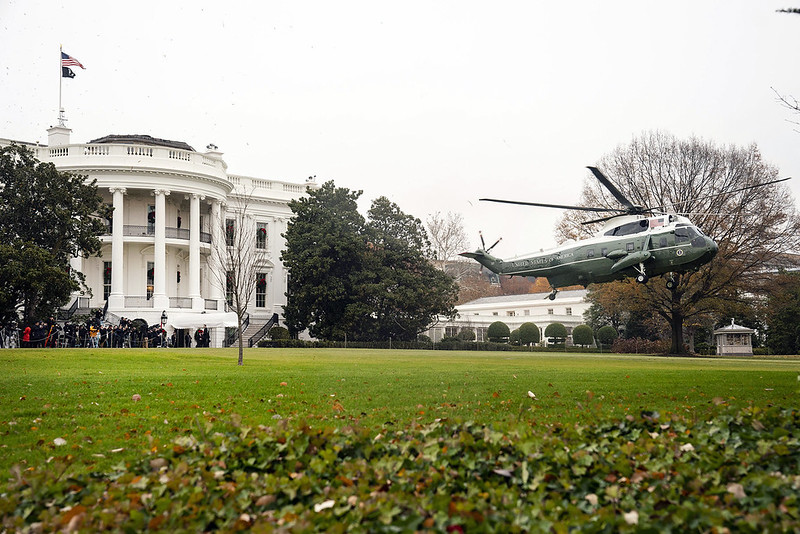The Trade-Offs in the Articles of Impeachment
The concerns of a member of Congress focused on political messaging aren’t the concerns of a prosecutor. And when a single document tries to speak to both sets of goals at the same time, compromises will have to be made.

Published by The Lawfare Institute
in Cooperation With

The draft articles of impeachment released on Dec. 10 by House Democrats reflect a series of careful and intentional strategic choices.
First, the document is short—just over eight pages. It contains only two articles of impeachment: one on abuse of power, and one on obstruction of Congress. It uses no Latin terms. It has no footnotes. It is written in clear language, without lawyerly turns of phrase or technicalities. It is designed to tell a straightforward story in terms that are easy to understand. It is, in short, a document meant to be readable by Americans, not just by lawyers.
If read as one would read a criminal indictment, the document’s brevity might seem strange. But that’s not the point. The point, rather, is to tell a story that is both well-supported by witness testimony before the House Intelligence Committee and that jibes with the instinct of most Americans that soliciting a foreign government to damage a domestic political opponent is wrong. It is designed to make things easy for House Democrats heading home for the holidays, who will be encouraging constituents to read the document for themselves. It is designed to support simple talking points for members to justify impeachment to their constituents in town hall meetings.
Second, the document’s simplicity is clearly intended to facilitate a trial strategy as well—to set up a Senate trial that tells a clean story. The articles, after all, are not a press release; they are a litigation document. Keeping things simple will allow the House impeachment managers to tell a single narrative through-line leading to two counts: The president abused his power in his interactions with Ukraine and then proceeded to try to block Congress from investigating his misconduct.
Third, the document clearly reflects a decision to focus not on criminal offenses but on structural abuses. It’s notable, for example, that the articles don’t mention the word “bribery”—an offense that the Constitution specifically notes as impeachable—even though they spell out how Trump’s actions fulfilled the different prongs of the bribery statute, describing how the president conditioned the performance of an official act on the receipt of a thing of value and did so with corrupt intent. This exclusion seems to reflect both a desire to treat the entire Ukraine affair in a single umbrella article covering “abuse of power” and a decision not to focus on a term that has a definition in U.S. criminal law. The latter approach could draw House managers into the rabbit hole of whether Trump’s conduct meets the current criminal statutory definition of bribery. The term “abuse of power” is not so burdened. As former Acting Attorney General Matthew Whitaker so memorably argued, “abuse of power is not a crime.”
Fourth, Nadler has chosen not to include an article based explicitly on findings in the Mueller report. That said, both articles allude to Mueller’s work. The first states that Trump’s efforts to extort Ukraine “were consistent with President Trump’s previous invitations of foreign interference in United States elections.” And the second article, on obstruction of Congress, makes a similar note: “These actions were consistent with President Trump’s previous efforts to undermine United States Government investigations into foreign interference in United States elections.”
But there is no article of impeachment based on obstruction of Mueller’s investigation. This reflects a strategic decision to stay away from the Mueller report, presumably because House Democrats elected from red districts may be skittish about impeachment on this basis. Focusing on the lowest-common-denominator approach and keeping the focus on Ukraine is an acknowledgment of the political reality that keeping the articles streamlined will garner more Democratic votes.
Yet for all the political benefits of this approach, it comes at a cost, too. The concerns of a member of Congress focused on political messaging aren’t the concerns of a prosecutor. And when a single document tries to speak to both sets of goals at the same time, compromises will have to be made.
For one thing, whatever articles the House adopts will inevitably create a precedent with potential consequences for future administrations. Too broad and simplified an account of Trump’s conduct may risk encompassing less objectionable executive branch conduct, which could facilitate later efforts to use impeachment as a partisan political tool. While these concerns are often overstated by those who oppose Trump’s impeachment, they reflect real concerns that were no doubt on the minds of the former executive branch attorneys advising House Democrats on the impeachment proceedings.
And then there are those costs that are chiefly visible in the form of what isn’t included. Back in September, some of us (Hennessey, Jurecic and Wittes) identified five areas of presidential conduct that merited articles of impeachment. Two areas, concerning Trump’s behavior related to Ukraine and his obstruction of Congress, are reflected in the articles produced by the House. But the House’s strategic choices result in other subject matter and fact patterns being avoided entirely. Take the president’s lies—which are, of course, too many and too widely varied to include in a single article, but present serious harm to the American public and democratic accountability. As the three of us observed,
[Trump’s] tenure has genuinely posed the question of whether the president has any obligation at all to tell the truth about anything—ever. His presidency is, among other things, advancing the proposition that the idea of “faithful” execution of the law implies no duty of candor at all… [H]ere impeachment is the only remedy. Congress cannot pass a law demanding that Trump stop lying or tell the truth a higher percentage of the time. It can only vote that lies of such magnitude and nature and frequency as the ones he tells are inconsistent with the conduct of the office he holds.
And there are others. The most obvious omission—as noted above—is the absence of an article related to obstruction of justice in the Mueller investigation. One of us (Hennessey) argued yesterday that Democrats would err in not including an explicit article based on the strongest episode of obstruction, both because of the importance of deterring similar misconduct by future presidents and because including an article regarding a clear criminal violation based on a well-developed record would provide a strong counterpoint to the emerging Republican defenses in L’Affaire Ukrainienne.
But even that modest inclusion would ignore other aspects of the president’s campaign against the FBI and the institutions of independent law enforcement: his efforts to pressure Attorney General Jeff Sessions into limiting the Russia investigation, his dangling of pardons to dissuade witnesses from cooperating with federal investigators and his seeking to remove the special counsel. And it also leaves out another of the more egregious presidential behaviors addressed in Volume II of the Mueller report: Trump’s effort to leverage the power of the Justice Department into politically motivated investigations and prosecutions of his political enemies.
The articles drafted by the House pay a price in their lack of completeness—which is the flip side of their streamlined simplicity. The trade-off of being able to tell a clean and concise story, after all, is that broad and sweeping narratives are ruled out. By focusing narrowly on Ukraine, the House risks forfeiting the ability to tell the full story of Trump’s efforts to leverage the power of the presidency to target his political opponents. Yes, Trump’s effort to pressure Ukraine to investigate Biden is part of this story—but so too are his private and public attempts to pressure the attorney general to investigate Hillary Clinton and his public demands that individual citizens like James Comey, John Brennan, Peter Strzok, Lisa Page and the family members of Michael Cohen be targeted for investigation. It may be easier to tell the story of how Trump tried to turn Ukrainian law enforcement to his own purposes, but what about his abuses of American law enforcement?
The same can be said of the article related to obstruction of Congress. The president’s instruction that current and former officials across the executive branch should not cooperate with the ongoing impeachment inquiry is a discrete and comprehensible offense. But this article of impeachment fails to capture how Trump’s actions represent an outright assault on the very notion of legislative oversight. This strategy ignores broader assertions outside the context of impeachment of absolute immunity and the frivolous claims of executive privilege over the testimony of individuals who have never even served in government. It ignores, for example, the White House’s direction that the executive branch not comply with requests for documents and testimony related to the security clearance process and questions on the U.S. census. While the refusal to comply with demands for information related to impeachment represents a heightened breach, the essence of the constitutional injury lies in the aggregate pattern. And while the articles incorporate these broader patterns by referencing Trump’s “previous” activity, that’s hardly enough to communicate the scope of the abuse.
The optimal balance between political strategy and legal precision is one on which reasonable minds can disagree. Ultimately, there’s not a single right answer—and given that Speaker of the House Nancy Pelosi has a caucus to wrangle, presumably the compromises these articles reflect were made with the counting of votes in mind. In a separate piece, we’ll suggest some specific changes to improve the draft articles within this framework.







-final.png?sfvrsn=b70826ae_3)

